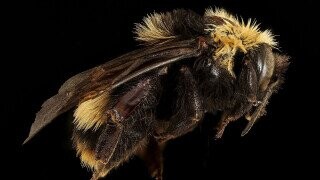Bees Are Fish, Affirms California Court

Bees have been having a difficult few years, as you've surely heard. And while you might shed a tear for any animal whose numbers have dropped, bees deserve extra attention because of how useful they are, in pollinating plants. When a species faces risk like this, we usually label it as endangered, allowing special protections. But when it came to bees in California, this proved tricky.
Some people stand to lose if we declare a few species of bumblebee endangered. Those would be agricultural groups, whom you might think would benefit the most from bees, since bees pollinate their stuff, but they're also the ones who don't want to shut down their harvesters every time a bee's in their path and they have to fear killing a protected species. So these farmers' groups challenged the bees' proposed protected status, and they discovered that, legally, the state can't treat these bees as endangered.
Bees made the federal endangered list in 2017, sure. California, however, has its own endangered list, which sets off its own protections, and its endangered species act uses very specific language. It says that it restricts activity around "any bird, mammal, fish, amphibia, or reptile" that's been declared endangered. Notice what's not on that list? Bees, or insects of any kind. We suppose insects were originally considered such a pest that no one thought we would ever need to conserve them, back when this law was written in 1970. That was five years before the feds declared the first endangered insects.
Don't Miss
Luckily for the bees, agricultural groups aren't the only ones skilled at poking through old laws. Conservationists (a different group from "agricultural groups"—confusing, we know) realized the Fish and Game Code provides a specific definition of "fish." For a while, this was "wild fish, mollusks, or crustaceans," but in 1969, they changed it to animals that are "wild fish, mollusk, crustacean, invertebrate, amphibian." They did this to include stuff like starfish and sea sponges, but they didn't specify aquatic invertebrates. They just said "invertebrate."
Invertebrates are any animals without a spine, a category that happens to include the vast majority of animals on Earth. According to the California Fish and Game Code, bees are therefore fish, as are worms and tarantulas. At the end of last month, a court ruled on the matter and said, yeah, we all know bees aren't really fish, but that's what the law says. So bees can be considered fish and treated as endangered after all.
This dispute covered four species of bumblebee. California has other bumblebees, as well as many other species of bee that aren't endangered. The newly protected bumblebees include the Crotch bumble bee and the Suckley cuckoo bumble bee, and for their names alone, those two must be saved at all costs.
This fact came from the One Cracked Fact newsletter. Want more like this, straight from your email inbox, without any ads or popups? Join here:
For more buzz, check out:
Every Year, One Place In California Rents 85% Of ALL Bees In The US
The 6 Most Mind-Blowing Superpowers of Bees
20,000 Bees Invade Elderly Lady's House Unnoticed
Follow Ryan Menezes on Twitter for more stuff no one should see.
